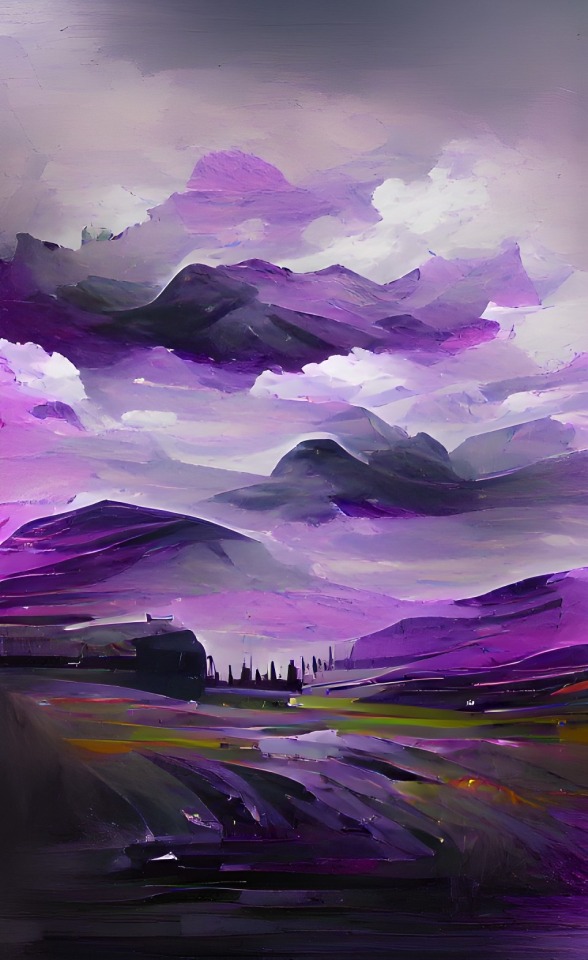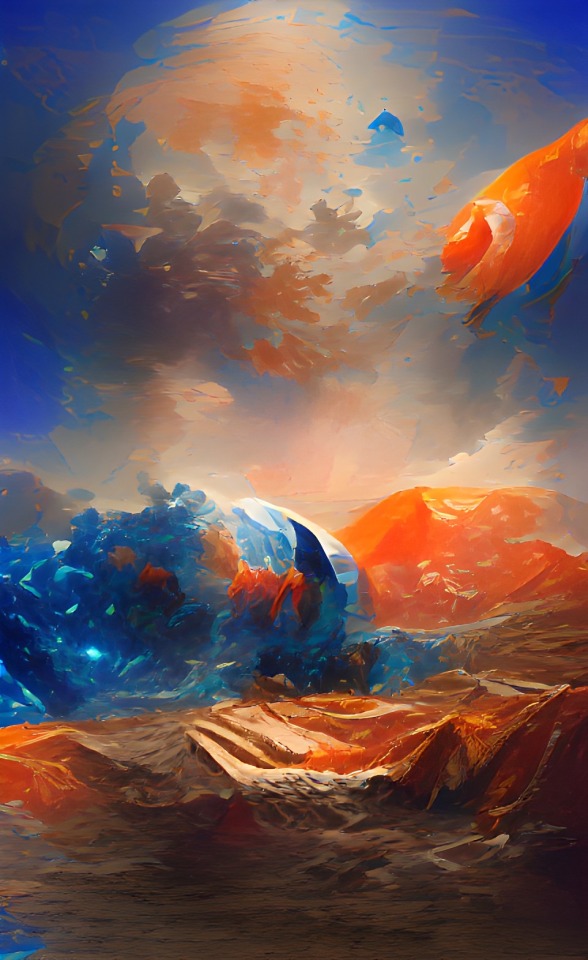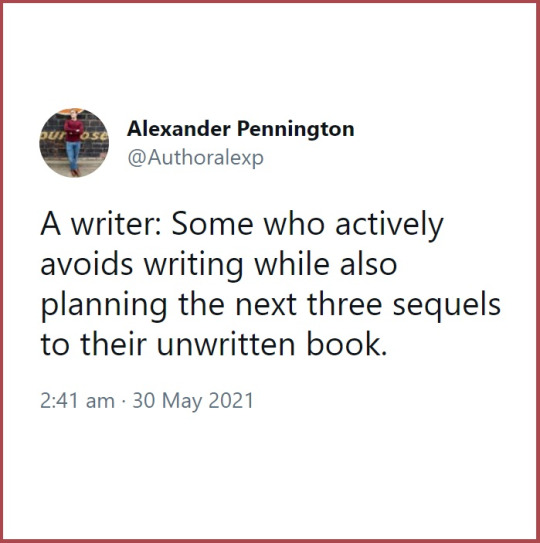Text
me, an aspiring author when i actually sit down to write:

2K notes
·
View notes
Text
What writers tell people their search history looks like: ‘how to unalive someone’ ‘best type of poison’ ‘how to escape the law’
What a writers search history really looks like: ‘synonyms for happy’ ‘is it affect or effect’ ‘how to find motivation to write’
732 notes
·
View notes
Text
Hahahaha omg


Minsung: being gay is NOT a choice.
Minsung: it's a game and we're winning.
450 notes
·
View notes
Text
writing is all fun and games until you actually have to sit down and write
1K notes
·
View notes
Text
me: I promise not to get distracted while writing
also me: *goes on Pinterest, Tumblr, Spotify, does literally anything else but writing*
me:

4K notes
·
View notes
Text
I've been looking for this 🍂
Booklist for all the Dark Academics:
[Dark Academia book recs of all the different kinds I could think of. It's a long journey. Buckle up.]
The Classic Dark Academic :
Jane Eyre by Charlotte Brontë
Wuthering Heights by Emily Brontë
Anything by the Brontë sisters
Frankenstein by Mary Shelley
The Picture of Dorian Gray by Oscar Wilde (this book birthed Dark Academia)
Rebecca by Daphne du Maurier
The Heart of Darkness by Joseph Conrad
Short stories by Edgar Allan Poe
Bram Stokers Dracula
Carmilla by Sheridan Le Fanu
Maurice by EM Forster
Madam Bovary by Gustav Flaubert
Crime and Punishment by Fyodor Dostoevsky
A Good Man is Hard to Find
To the Lighthouse by Virginia Woolf
Macbeth by Shakespeare
Othello by Shakespeare
Les Miserables by Victor Hugo
The Poetry-lover Academic:
Poetry of Baudelaire
Odes of Keats (ALL OF THEM ARE A MUST READ)
Poetry of Edgar Allan Poe (especially The Raven)
Shelley's Alastor, Prometheus Unbound, Masque of Anarchy
Kubla Khan by Coleridge
T.S Elliott's Wasteland
all Emily Dickinson poetry but especially 'I felt a funeral in my brain', 'Because I could not stop for death' (read them a thousand times already)
Pablo Neruda's Nothing but Death
Langston Hughes Poems
Tennyson's Lotos eater (underrated gem)
Sylvia Plath poems but special mentions to Lady Lazarus and the Bell jar
Paradise Lost by Milton (if you want to include something about the Devil in your list)
Poems by Sappho
Poems of Charles Bukowski (especially Love Is a Dog from Hell)
The Contemporary Dark Academic:
A Lesson in Vengeance by Victoria Lee
The Secret History by Donna Tartt (the origin of Dark Academia)
My Dark Vanessa by Kate Elizabeth Russell
Ace of Spades by Amanda Foody (could recommend it a hundred times)
The Maidens by Alex Michaelides
If We Were Villains by ML Rio
Ninth House by Leigh Bardugo
The Shadow Lines by Amitav Ghosh
The Goldfinch by Donna Tartt
The Temple House Vanishing by Rachel Donohue
The Prime of Miss Jean Brodie by Muriel Spark
The Girls are all so nice here by Laurie Elizabeth Flynn
Heaven by Mieko Kawakami
Wilder Girls by Rory Power
The Likeness by Tana French
Never let me go by Kazuo Ishiguro
One of us is lying by Karen Mcmanus
Bunny by Mona Awad
The Plot by Jean Hanff
The Starless Sea by Erin Morgenstern
The Lessons by Naomi Alderman
A Discovery of Witches by Deborah Harkness
Conversion by Katherine Howe
Plain Bad Heroines by Emily M. Danforth
Love is a Dog from Hell by Charles Bukowski
A Little Life by Hanya Yanagihara
A Quaint and Curious Volume
We, the Drowned by Carsten Jensen
The Little Friend by Donna Tartt
The Rules of Attraction by Bret Easton Ellis
Walden by Henry David Thoreau
Jonathan Strange and Mr Norrell by Susanna Clarke
The Lying Games by Ruth Ware
Black Chalk by Christopher J Yates
The Lake of Dead Languages by Carol Goodman
The Furies by Fernanda Eberstadt
The Catherine House by Elisabeth Thomas
Bad Habits by Charleigh Rose
Good Girls Lie by JT Ellison
Shadow of the wind by Carlos Ruiz Zafon
The Historian by Elizabeth Kostova
If We were Villains by M.L. Rio
Queer Dark Academic:
THE PICTURE OF DORIAN GRAY (yes, yes, yes it's the gay shit)
Notes on a Scandal (What was she thinking?) by Zoë Heller
Hex by Rebecca Dinerstein Knight
Carmilla by Sheridan Le Fanu (lesbian vampire, hell yeah!)
The Starless Sea by Erin Morgenstern
Maurice by EM Forster
Christabel by Coleridge
Poems by Sappho
Plain Bad Heroines by Emily M Danforth
They Never Learn by Layne Fargo
Ace of Spades by Amanda Foody
The Dark Romantic Academic:
Plain Bad Heroines by Emily M Danforth
The Lessons by Naomi Alderman
Jane Eyre by Charlotte Brontë
Wuthering Heights by Emily Brontë
Never let me go by Kazuo Ishiguro
The Likeness by Tana French
The Temple House by Rachel Donohue
The Marriage Plot by Jeffrey Eugenides
Ninth House by Leigh Bardugo
A Discovery of Witches by Deborah Harkness
Mythological Dark Academic:
(pardon me for my cluelessness)
I have not really read much about mythology but if Norse mythology is the area of your interest, Neil Gaiman is the God of it. (aka not only Good Omens and American Gods, but also the book 'Norse Mythology')
The Furies by Fernanda Eberstadt
The Song of Achilles by Madeline Miller
Circe by Madeline Miller
Ovid's Metamorphoses for Greek mythology enthusiasts
[Remember: Some of these books have dark academia as their major aspect but most of them have dark academia as their minor aspect, and many of them have been put into the list because I got a dark academia kind of vibe from them. Moreover these books have a lot more to offer than just Dark Academia, even if we ignore that aspect, these books are just great pieces of literature. This list is entirely created out of my own reading researches, friendly recommendations, and book recs from reddit, pinterest and the internet in general. If I have gone wrong somewhere or if you want me to add something new, feel free to drop an ask.]
6K notes
·
View notes
Text
If anyone else out there is a writer holy shit you have my deepest respect because writing is one of the most mentally tiring and time taking activities you can do and as a writer, I know how hard it can get to even have the energy to continue a project without getting distracted or just giving up because you don’t feel like the idea is working anymore. You all are wonderful and I hope the most amazing idea comes to you and you are able to have that same motivation that you had at the beginning.
2K notes
·
View notes
Text
sAmE!!!! :(((
i call myself a writer even though i spend alot of time reading other writer's work and complaining about how i could never write like them.
6 notes
·
View notes
Text
The ace and aro!!! So pretty!!!!!
abstract landscapes pride wallpapers










lesbian | gay/mlm
bi | trans
lgbtq | pan
ace | aro
aroace | nonbinary
pls rb if saving :)
more here
22K notes
·
View notes
Text
HAPPY INTERNATIONAL ASEXUALITY DAY
Happy Ace day to all my fellow Acespecs
To the Asexuals, Demisexuals, Greysexuals
To the Aceflux’s and cupiosexuals,
To the lithosexuals, fraysexuals
To all those on the ace spec that I haven’t listed
To the sex favourable. the sex indifferent, the sex repulsed
To those who are acepec: arospec, hetero romantic, bi romantic, homo romantic, pan romantic
To those still questioning or confused
To all those who are apart of this community (sorry if I did not list above)
You are all valid and beautiful.
Happy International Asexual Day 💜 🖤🤍
7K notes
·
View notes
Text
To improve as a writer, you have to write. You can master the rules, study the techniques, but to become better, creating stories is vital.
- D
189 notes
·
View notes
Text
“The reason we write fiction is because it’s so much easier to exist spending part of each day in an imaginary world.”
— Kurt Vonnegut
1K notes
·
View notes
Text
MINSUNG (。♡‿♡。)
lino was about to throw hands till he realized it was jisung 😂🍑
336 notes
·
View notes
Text
Beginner to intermediate (A0 to B2) study tips

Hi! Here is a masterpost of my self-study tips. I'm going to copy one of my posts onto here.
Some general rules
Make language learning a habit.
Be consistent.
Have a plan and clear goals. Know which skills you want to focus on and how you want to study.
Make sure you have a solid foundation in vocabulary and grammar.
Store all of your notes in one place.
Use a variety of resources but not too many. One or two per skill is enough.
Focus more time on practicing than on learning vocabulary and grammar.
Get corrections. HiNative is good for this. Journaly is also good for writing. You could also get a study buddy.
Have fun!
How to start learning a language (A0 to A1)
Learn the alphabet! You can do this using flashcards. Make sure you practice writing the words and memorise the stroke order. For languages like Japanese or Mandarin Chinese that have characters, learn some of the most basic characters and their stroke orders.
Immediately start working on your pronunciation! Watch some pronunciation guide videos, and then start speaking and shadowing. Make sure a video has subtitles in the language, and try to say everything being said in the video (make sure it is beginner friendly) right after it is said.
Use an app! Duolingo, Lingodeer, HelloChinese and Memrise are just a couple of incredible ones. I highly recommend them.
Complete an online course or a beginners textbook! There are loads available for free online. Hell, there are loads available on this website. Make sure the approach is vocabulary based, not grammar based, as that will be more useful for you. Also, make sure that audio is available to you.
Start texting natives on apps like Tandem or HelloTalk! This gets very good results, as you can learn new vocabulary being texted to you, along with being able to look up new common greetings and phrases while you are texting.
Memorise basic vocabulary and grammar! Learn the basics of present tense, gender, adjective agreement, word order and some structures, along with a few vocabulary lists of necessary vocabulary (common greetings, animals, colors, family etc.). For grammar, I’d recommend just using a workbook, and for vocabulary, flashcards are very good.
Immerse! Try to listen to and read the language in your dead time, so you can get used to it. Turn the language of your phone to your target language. Read tweets in the language. Watch YouTube videos about fun subjects that you like. If the language you are learning is particularly difficult (like Japanese and Chinese), then try and read and listen to fun learners exercises. Generally just try to get used to the sounds of your target language, and reading the alphabet or familiar characters.
How to go from beginner to intermediate (A1 to B1)
Use a textbook or online course! Don’t skimp: get a dense one. Make sure that you don’t use a grammar based one over a vocabulary/practice based one. If you use a textbook, then make sure that it has audio with it. Also, make sure to learn all the vocabulary on the course, and also do all the exercises.
Work through a grammar book! You can do the exercises, turn it into a cheat sheet or something like that. Try focusing more on using the rule/structure than writing notes.
Expand your basic vocabulary! Try making a list of topics that you definitely need to be able to have a basic conversation with a native. The GCSE specification is a good guide for this. Add to that vocabulary about subjects that interest you (e.g. science, language learning etc.). You can learn this using a bunch of methods, but my personal favourite is flashcards.
Find a speaking buddy, and speak! This is simple, but it works. Try to find somebody to speak with and have basic conversations in your target language with. Do this however often you would like. You can also try having conversations with yourself without looking at your notes. Make sure to look up words that you don’t know but want to use. Also, you can try memorising set phrases and vocabulary around certain topics, and talk about them. You might also use a script, if you want. You can find a buddy on Tandem or HelloTalk, or maybe even HiLokal.
Immerse. Listen to music, change your phone's language to the language, follow people on social media and watch YouTube videos.
Read and watch content for native children. It is usually at the perfect level for beginners. I’m planning on watching a lot of Peppa Pig in Spanish to expand my vocabulary. It is difficult enough to strengthen your skills and simple enough for you to understand it. You’ll also learn a lot of widely used vocabulary.
Shadow native material. This is honestly the best way to practice your pronunciation. Get ahold of a video (Easy Languages is amazing for this!) and repeat what is said after it is said. Copy the intonation and imitate the sounds being made.
Text natives on Tandem or HelloTalk. This is just generally quite a useful way to practice your writing. Look up words that you do not know and write them down to memorise later. You can memorise set phrases to use in conversation, and also practice reading what they text you too. Also, it is just a nice way to meet new friends.
Engage with intermediate content in the language. I know it is difficult, but it will get you used to more complex language. Find intermediate podcasts with transcripts, and read along with what is said.
Read and listen to native material related to your interests! Personally, I like language learning, so I watch a lot of videos on that. Go for something where they do not use a lot of slang or jargon, and speak at a relatively normal speed. Videos and articles that explain concepts or offer advice are usually good for this.
How to go from intermediate to conversational (B1 to B2)
Listen to intermediate level podcasts and videos. There are loads of podcasts and youtube channels that offer intermediate material for learners, like InnerFrench, a piece of French, iyagi and dreaming spanish. Innovative languages also offer intermediate level podcasts. You should be able to understand a lot of it, though there will definitely be quite a bit that you don’t. Make sure to look at transcripts/subtitles, and note down words you don’t understand.
Shadow native material. I personally believe Easy Languages is the absolute best for this.
Watch TV shows and films. Make sure that they don’t use any jargon or time-period specific language. Choose something like a romance or coming of drama, that has common vocabulary. Don’t just watch an episode once either. Keep on repeating it until you can understand enough of it to get what is going on.
Keep a journal in your target language. Try and write about a range of subjects. Also, get corrections.
Speak. What I have advised earlier is applicable here. Also, learn how to talk around words when you don't know them.
Work through a grammar book. Do practice questions and make your own example sentences.
Read articles and books about subjects that interest you.
Read fanfiction in your target language.
Watch videos and the news in your target language.
Try writing short stories and essays. You can use vocabulary you learn from books here! Try memorising set phrases. Choose a topic/story that you're passionate about.
Ways to learn about culture, history and linguistics
Research dialects! Look into how languages change depending on the area, and how they adapt to the different needs of different cultures.
Cook popular recipes!
Subscribe to popular youtubers, magazines and newspapers.
Research how religion affects the countries where your target language is spoken.
Read books on the linguistics and history of your target language.
Listen to podcasts in the language.
Read classic and influential literature. You can use a translation if you aren't at that level.
Read wikipedia pages about topics that interest you.
Ask native speakers questions.
Watch the most popular TV channels in countries where your target language is spoken.
Watch films, documentaries and TV shows. This can give you a taste of the culture AND the language.
Subscribe to YouTube channels by immigrants who have moved to countries where your target language is spoken (or vice versa). This provides a unique perspective, and can be helpful for learning about some of the bigger cultural nuances.
Research famous art and artists that spoke your target language. I really like Stromae (a french artist), so my fangirl habits have led to me making some pretty interesting discoveries about French music and slang.
And that’s pretty much it! I haven’t reached the advanced stage in any of my languages, but when I do, I’ll write a post on overcoming the intermediate plateau. I hope this was helpful. Thanks for reading my post!
869 notes
·
View notes



